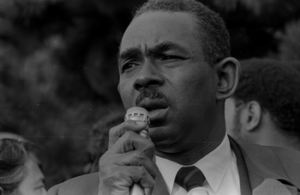
Carlton B. Goodlett
*Carlton Goodlett was born on this date in 1914. He was a Black physician, newspaper publisher, and political activist.
Carlton Benjamin Goodlett was born in Chipley, Florida, to Fannie T. Russ and Arthur Goodlett and later migrated to Omaha, Nebraska. He was the youngest of two children. His sister's name is unknown, but when she was five and Carlton was three years old, her dress caught fire from the house's fireplace embers and subsequently caught on fire. She managed to get Carlton out but did not survive. Goodlett was a brilliant child, often following his sister to school, being too young to attend. The teacher turned him away repeatedly until she decided to take him seriously and let him stay.
He received a bachelor's degree in 1935 from Howard University in Washington, D.C.. In 1938, he became one of the first African Americans to earn a doctorate in psychology from the University of California, Berkeley, at the age of 23. In 1944, he completed his Doctorate in Medicine degree at Meharry Medical College. Returning to San Francisco in 1945, he opened a medical practice to serve the burgeoning new Black community that had been drawn to the city by the war industries. At the same time, he emerged as a civil rights advocate.
As president of the local branch of the National Association for the Advancement of Colored People (NAACP) from 1947–49, he protested The City's discrimination against hiring Blacks for its public transportation system, demanded improvements in public housing, and exposed the exclusion of Blacks and Jews from draft boards in San Francisco. One problem Black physicians encountered in San Francisco was their inability to practice in local hospitals. They could send their patients to the hospital, but lost them at the hospital door, where Black doctors were barred from following through with their patients' treatment. Under Goodlett's leadership, all nonwhite physicians won the right to see patients at all public hospitals in the City.
Goodlett was also a businessman who developed townhouses, open to all San Franciscans, on Steiner Street and Geary Boulevard. In 1948, he became co-owner of The Reporter, a community weekly edited by his old friend Thomas C. Fleming, which then absorbed its competitor, The Sun, to become The Sun-Reporter. In 1951, Goodlett became the sole owner. He wrote most of the editorials and established it as the leading Black newspaper in Northern California. In 1971, he added Oakland's California Voice and seven Metro-Reporters to his chain. He served three terms as president of the National Newspaper Publishers Association (Black Press of America). By the late 1950s, through a constant barrage of speeches before community groups and the growing influence of his newspaper, Goodlett had become one of the city's prominent Black leaders.
Using his combined newspapers to become a political force in San Francisco, Goodlett cultivated friendships with leading Black entertainers, artists, and politicians, including W.E.B. Du Bois, Paul Robeson, and Dick Gregory. 1950, Goodlett, along with Phillip Burton and others, founded the San Francisco Young Democrats. Goodlett and Phil Burton supported Willie L. Brown Jr. for a California Assembly seat in 1962. Goodlett named him the Sun-Reporter Man of the Year and financed his $7,500 campaign. Brown narrowly lost that time but won in 1964 and went on to serve as Speaker of the Assembly for over 14 years, a state record. Later, Brown served as Mayor of San Francisco for eight years.
He was frequently and sharply critical of his Democratic friends, such as President John F. Kennedy and Governor Edmund G. "Pat" Brown, for not moving fast enough on civil rights and other causes. In 1966, Goodlett ran for governor in a protest against Pat Brown. He finished third out of six candidates in the Democratic primary, with 95,000 votes. Until the emergence of the Black Panther Party in the late 1960s, Goodlett was the dominant figure in San Francisco's movement in securing jobs for blacks and appointments to important city commissions that Blacks had never held.
Goodlett was arrested in 1968 while supporting a San Francisco State University student strike demanding a Black studies department. The students won, and the University became the first in the nation to have a Black studies program. He maintained a busy medical practice in his newspaper office until he retired from medicine in 1983. Carlton Goodlett died on January 25, 1997.